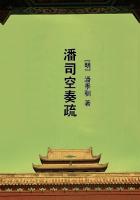"It is the most irrefutable consequence of the right of existence; It must be an equal right; for the necessity of the means ofexistence is alike for all. No one, certainly, should live at the expense of another: but the man, who has not forfeited hisright, is entitled to live independently; he has a right to be so placed, as that his labour and his means of existence shall notbe dependent on the pleasure of others. However free he may be in person, if he does not, of natural right, possess somecapital; if he is not a proprietor, as well as a man and a labourer, he only produces, and only lives by the permission of hisfellow-men:actually he is in servitude. It cannot be too often repeatedproperty is an absolute condition of liberty. We maynot disregard mankind's first and most sacred of titles, the title to the possession of property." (2)To carry out this natural right of property, M. Huet proposes that the law should enjoin, "that at every decease, the freeportions of the patrimony should go to all the young labourers equally. Succession, constituted on these socialisticprinciples, would thus reproduce, in each generation, the .fraternity of the primitive partition.""The morality of succession would be improved by such generalization: the temptations to which the present system exposesneedy and eager heirs are only too well known. Each inheritance is a prey for the vilest passions to quarrel over. Too oftenwe hear hateful hopes expressed. Far from weakening the family, the right of inheritance would purify and strengthen it. Itcreates a feeling of security. The fault or misfortune of the father does not condemn an unfortunate posterity to permanentinferiority. Under this system of real socialism, there exists in fact a general confidence between father and children.
"Now, the children of the poor are cast naked on the bare earth, as though they were born in a savage state. They have noties, no ancestry. The right of patrimony would connect them once more with the human race. It is a marvellous agrarian lawwhich, without arbitrariness or violence, without putting any limit on property, or despoiling or disturbing any one, securesfor ever the independence of the labourers and maintains the long succession of generations on a level of equality."What M. Huet poposes is nothing else than the system of landed property in force in the primitive village and in theAllmend.
Let us now see what Mr Herbert Spencer says:--"Given a race of beings having like claims to pursue the objects of their desiresgiven a world adapted to the gratification ofthose desiresa world into which such beings are similarly born, and it unavoidably follows that they have equal rights to theuse of this world. For if each of them `has ******* to do all that he wills provided he infringes not the equal ******* of anyother,' then each of them is free to use the earth for the satisfaction of his wants, provided he allows all others the sameliberty. And conversely, it is manifest that no one, or part of them, may use the earth in such a way as to prevent the restfrom similarly using it; seeing that to do this is to assume greater ******* than the rest, and consequently to break the law.
"Equity, therefore, does not permit property in land. For if one portion of the earth's surface may justly become thepossession of an individual, and may be held by him for his sole use and benefit, as a thing to which he has an exclusive right,then other portions of the earth may be so held; and eventually the whole of the earth's surface may be so held; and ourplanet may thus lapse altogether into private hands. Observe now the dilemma to which this leads. Supposing the entirehabitable globe to be so enclosed, it follows that if the landowners have a valid right to its surface, all who are notlandowners, have no right at all to its surface. Hence such can exist on the earth by sufferance only. They are all trespassers.
Save by the permission of the lords of the soil, they can have no room for the soles of their feet. Nay, should the others thinkfit to deny them a resting-place, these landless men might equitably be expeled from the earth altogether. If, then, theassumption that land can be held as property, involves that the whole globe may become the private domain of a part of itsinhabitants; and if, by consequence, the rest of its inhabitants can then exercise their facultiescan then exist evenonly byconsent of the landowners; it is manifest, that an exclusive possession of the soil necessitates an infringement of the law ofequal *******. (3) For, men who cannot `live and move and have their being' without the leave of others, cannot be equallyfree with those others"...
"On examination, all existing titles to such property turn out to be invalid; those founded on reclamation inclusive. It appearsthat not even an equal apportionment of the earth amongst its inhabitants could generate a legitimate proprietorship. We findthat if pushed to its ultimate consequences, a claim to exclusive possession of the soil involves a landowning despotism. Wefurther find that such a claim is constantly denied by the enactments of our legislature. And we find lastly, that the theory ofthe co-heirship of all men to the soil is consistent with the highest civilization; and that, however difficult it maybe toembody that theory in fact, Equity sternly commands it to be done."Neither M. Huet nor Mr Herbert Spencer appears to have thought that this right to patrimony or joint-heirship could be putinto practice immediately, in the midst of the imperfect and complicated relations of modern society. They have framed anideal scheme;but the remarkable point is that this ideal is identical with the form of landed property, spontaneously appliedby primitive societies of every nation and every country. The future, to which they look forward, would thus only reproducethe past, but in other forms.















